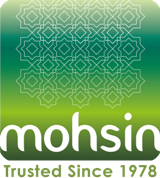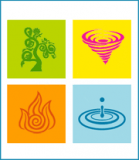Tibb is an Arabic word which in different places of the world, has been referred to as Arabic, Greco-Arab, Hikmah, Yunani, Oriental, Islamic, Prophetic, and Sufi medicine. Some of the most illustrious names in medical tradition such as Ar-Razi of Persia, and Ibn Al-Baytar of Andalusia, Spain, are associated with the tradition of Tibb. Maimonides of Cairo, Egypt and Ibn Sina (Avicenna) were practitioners and teachers of Tibb. Tibb is a tradition of health whose synthesis was in the crucible of the Middle East, and integrates elements from Egypt, India, China and Classical Greece.
Today, Tibb continues to provide relief for millions of people in India, Pakistan, Afghanistan, Bangladesh, Malaysia, various parts of the Middle East, Africa, USA, Europe and the United Kingdom. Unani Tibb is recognised by the World Health Organisation as a tradition of medicine.
“We have sent among you an apostle Muhammad ﷺ from among yourselves, rehearsing to you Our signs and instructing you in scripture and wisdom and in new knowledge.” (Surat al-Baqarah, ayah 150)
The perspective of Hikmah (wisdom) is reflected in the institution of Nubuwwa (Prophethood) ending with the Final Nabi Muhammad ﷺ. The principle of Tawhid (oneness and unity) permeates deep into the structures of the cosmos and human self.
Ṭibb-un-Nabawi – Prophetic Medicine is:
“A compilation and systematization of an aspect of the legacy of the Prophet ﷺ in the domain of diet, health and illness complementing the legal, intellectual and spiritual dimensions of the legacy he left…”
Ṭibb-un-Nabawi led to the synthesis of Tibb as a whole:
“This medicine remained distinct while interacting with the medicine which was then being learned from Greek, Persian and Indian sources, the latter process resulting in that synthesis in the hands of such masters as al-Tabarī, al-Rāzī and Ibn Sīnā…”
Ilm-un-Nafsiyat is a wisdom-based, transcendent, and time-tested discipline of psychotherapy and counselling located within the tradition of Tibb. The knowledge and practice of Nafsiyat offers a most suitable solution towards re-balancing the inner turmoil of the human being.
The College of Medicine and Healing Arts (CoMHA) is a leading organisation for practice, research, and training in the wisdom and science of Tibb (whole-person healthcare and medicine) as well as Nafsiyat (holistic psychotherapy and counselling), established in Leicester, England.
We are an initiative dedicated to develop and synthesise traditional knowledge and forms of medicine such as Unani Tibb, Tibb-un-Nabawi, and Ilm-un-Nafsiyat, along with useful and beneficial research and innovations from Complimentary & Alternative Medicine (CAM).
Mohsin Health (providing consultations, natural remedies, and trusted health information), since 1978, and College of Medicine and Healing Arts (CoMHA), since 2011, are pioneers and custodians of these knowledges and skills.
The College welcomes you into its fold and we look forward to serving you as our valued learner and student.
These professional Diploma programmes are available for those interested in learning traditional (Tibb) and modern (Complimentary & Alternative) skills to help patients and clients:
- Diploma in Herbal & Naturopathic Medicine (Tibb)
- Diploma in Counselling & Psychotherapy (Nafsiyat)
Diploma in Herbal & Naturopathic Medicine (Unani Tibb): you may wish to set up your own practice as a herbalist, naturopath, nutritionist, wellbeing counsellor, or personal health advisor.
Diploma in Psychotherapy & Counselling (Nafsiyat): you may wish to set up your own practice as a counsellor, relationship counsellor, wellbeing advisor or psychotherapist.
As a CoMHA graduate you will have access to continuing support after graduating, as well as clinical supervision.
You may also continue your training with a specialisation Diploma (e.g. Diploma in Iridology) with the College of Medicine and Healing Arts, expanding your range and depth of knowledge and skills.
Detailed curricula for our Diploma programmes are available in our latest prospectus.
To achieve a Professional Diploma, detailed assessment criteria are available in the Student Handbook. Briefly, a student must complete the following:
- 1st Year: Attend foundation level, i.e. stages 1 & 2;
- 2nd Year: Attend practitioner training, i.e. stages 3 & 4;
- 3rd Year: Attend clinical practice level, i.e.stages 5 & 6.
In between in-person class attendance of 6 stages, students dedicate 6-10 hours per week of home study for:
- Satisfactory completion of all homework assignments;
- Completing a minimum of ten client case studies;
- Sitting final exams including written and practical.
Our Diploma programmes can be completed within 3 years depending on the student satisfying all of the assessment criteria within this time (full assessment criteria are available in the Student Handbook).
The in-person training days for our Diploma programmes take place in two locations:
- Leicester, UK
- Pennsylvania, USA
We welcome both local and international students alike.
Our Diploma programmes begin with the personally transformative programme Foundation in Tibb (Natural Health) as the first year. The Foundation in Tibb (Natural Health) level is open to adults with the ability to read and write in English. Entry onto subsequent stages of the Diploma is dependent on successfully completing Foundation in Tibb (Natural Health) which may include homework assignments, as well as your tutor’s assessment of your suitability.
The college offers a fees structure that is competitive compared with other reputable herbal and naturopathic colleges in the UK. The fees for each of our Diploma programmes are £10,000 over a 3-year period. This can be reduced by up to 15% to as low as £8,500 with early-enrolment discounts.
As a small independent college, we are not in a position to provide financial assistance. However, instalment plans for fees are available at no extra cost to those who require this facility.
All responsibility for attaining the relevant travel authorisations and documents to attend our programmes rests solely with the student. The College will not accept any responsibility for students in relation to travel and border control.
The College does not sponsor any student visas. Admission onto our programmes does not guarantee any visa status.
If the student wishes to have evidence of their acceptance onto the programme, the College can provide a letter of acceptance.
The College of Medicine and Healing Arts (CoMHA) is accredited by The Guild of Unani Tibb (TGU).
CoMHA has excellent credibility and reputation within the fraternity of Tibb, due to its high standards. Graduates of CoMHA are respected by their peers within complementary and alternative medicine (CAM).
After enrolment in a professional Diploma, student membership can be acquired. Successful graduates can apply to join the Guild as practitioner members. Go to www.TheGuildOfUnaniTibb.com for details.
Successful gradates of CoMHA can apply for professional insurance before they begin their practice. This protects them and the public.
Click here to see the full playlist of video testimonials as well as a list of written testimonials that have been collected over the years.

